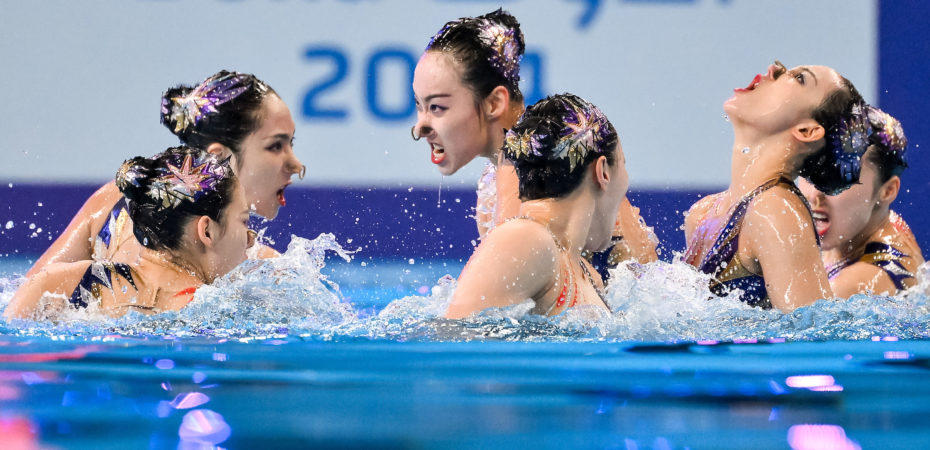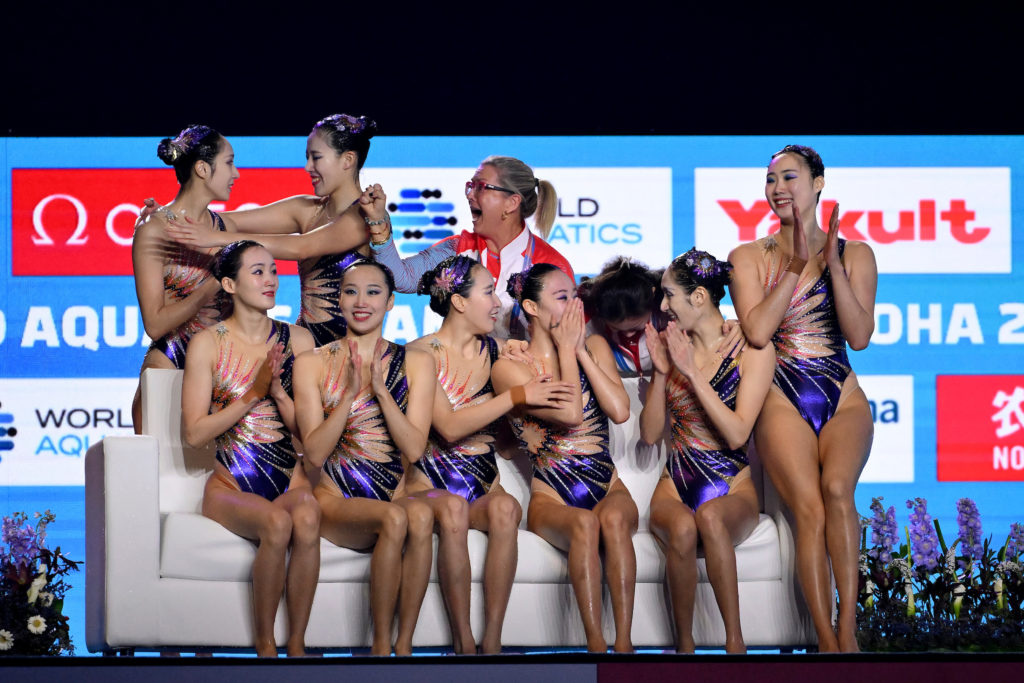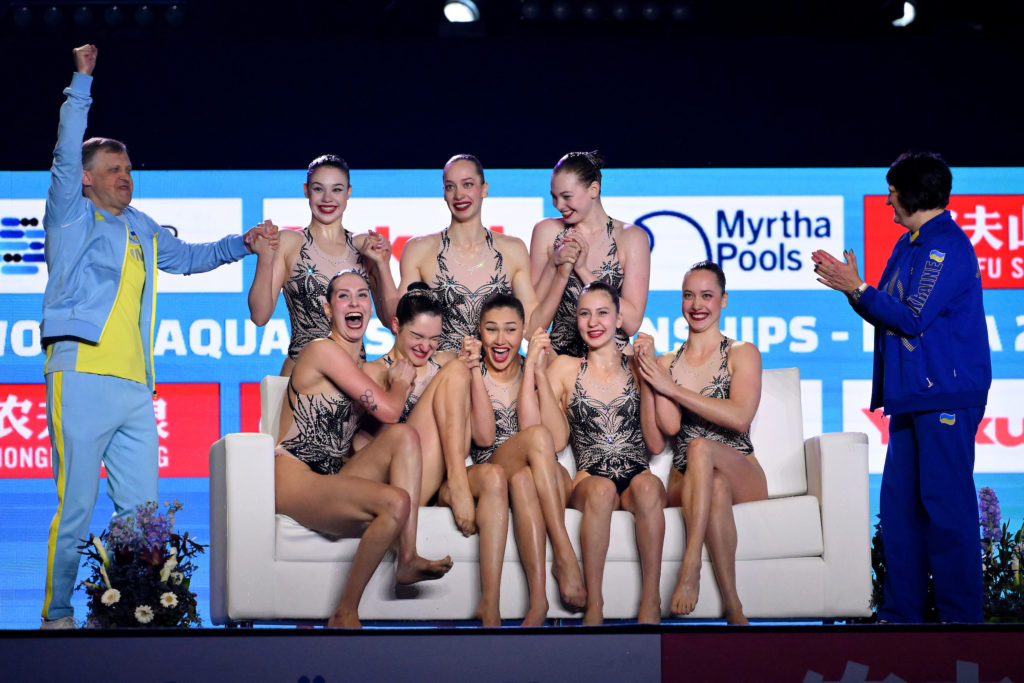The third day of artistic swimming at the 2024 World Championships saw two more finals unfold, one more dramatically than the other. In the first final of the day, China successfully defended its title and remained World Champion in the acrobatic team. A few hours later, Kazakhstan made history by claiming its first-ever gold not only in artistic swimming but also all aquatics disciplines, triumphing in the technical mixed duet thanks to Nargiza Bolatova and Eduard Kim.
In the morning, Vasiliki Alexandri of Austria displayed exceptional skill and secured the top spot in the women’s free solo preliminary, setting the stage for an exciting final in a few days.
ACROBATIC TEAM FINAL
The first final of the day was the high-flying acrobatic team event, which officially set the tone for the Olympic qualification amongst the various countries. Naturally, the door remains wide open and anything can still happen, since all three team event scores (technical + free + acro) will be added up to determine the five nations that get the final spots.
China, the reigning World Champion, had qualified in first place and was able to retain its title in Doha. Swimming its “Light of Life” choreography, the Chinese were sharp, high and precise in every acrobatic movement. They scored 244.1767 to win their first gold of these World Championships.
Ukraine had placed second in the preliminaries, and similarly maintained its standing in the final, scoring 243.3167 for silver. The Ukrainians were particularly thrilled, especially after finishing seventh at the last World Championships.
“Of course, we feel so happy but we know that two more important events are still ahead,” Marta Fiedina said. “Three actually, with the duet. So now, we are happy but we know that we have to concentrate and work hard for our future.”
After spending months training in Kyiv last year, the team returned to its homebase in Kharkiv. Obviously, the training conditions have been difficult and far from ideal, but the athletes hope to push through until the end to be able to represent their nation on the Olympic stage once more.
“Preparing for this World Championship was hard of course,” Fiedina continued. “Physically of course, but it was even harder mentally. Everybody knows the war is still continuing in Ukraine, and in Kharkiv everyday we hear explosions and air alerts… So we are proud to be here. This is a big responsibility for us to represent our country, and we want to continue showing how brave the Ukrainian people are.”
The US team, silver medalist in 2023, had undoubtedly a much better performance than in the preliminaries, where it had placed sixth. This time around, the Americans performed all their acrobatics as intended, and were credited with their full DD of 24.60, a 0.20 increase from what they had declared yesterday, to win the bronze medal.
“Yesterday we had a challenge in the prelims,” Bill May said. “We took it exactly as that… As a challenge to show the world just how strong the USA is, how we are looking forward to competing in Paris at the Olympics. This is the best team in the world. We come as an army, we are strong as one, we showed the world exactly what a team looks like and what unity is.”
Just like in the preliminaries, Canada had another impeccable swim and was able to maintain itself in fourth place with a score of 222.1367 with its hip-hop routine. The team of Mexico had placed third in the preliminaries, but unfortunately received two basemarks in the final and dropped to 10th.
For its first-time out in the event under the new scoring system, Spain should be satisfied with its fifth-place finish and a basemark-less swim. The Spaniards performed to a mix of Eminem and Carmina Burana and scored 219.9367, nearly matching their score from the preliminaries. With that event now out of the way, the country will look forward to moving on to its stronger events, especially the technical team where it will look to defend its title.
Besides the USA, Italy was the only other team that increased its DD between preliminaries and finals. Swimming to the theme of the Venice Carnival, the Italians were credited with their full difficulty and scored 213.3501 for sixth place.
Japan and Israel will likely be disappointed after suffering basemarks in today’s final, respectively dropping them to seventh and ninth place. The Japanese squad, bronze medalists at last year’s World Championships, had already received a basemark in the preliminaries and had even slightly decreased their DD by 0.2 for the final. However, their sixth acrobatic movement was still not credited today.
Israel performed a very fun and engaging new choreography to the theme of “Mamma Mia”, but had some difficulties on its opening platform acrobatic, which is where the basemark occured. Both nations certainly also know that the acrobatic team is their weaker event of the three, and like Spain, will now look forward to moving on to where their strengths lie.
The team of Greece will also surely feel dissatisfied after today’s outing, which resulted in two basemarks and a 12th-place finish. The attention to detail in this “Snakes” routine was however quite noteworthy, with the athletes even wearing contact lenses to transform their eyes so they looked like those of a snake.
TECHNICAL MIXED DUET FINAL
The second final of the day gave us a podium nobody undoubtedly expected, especially after the preliminary’s results, with Kazakhstan in gold, China in silver and Mexico in bronze.
Nargiza Bolatova and Eduard Kim of Kazakhstan had qualified to this final after finishing fourth in the preliminaries, but now walk away with a historical gold thanks to a score of 228.0050 for their “Corpse Bride” routine. After a clean swim and benefitting from mistakes from some of the medal favorites, the Kazakh pair not only earned the country’s first World Championships title in artistic swimming, but also first across all aquatics disciplines.
Eduard Kim is no stranger to making history for his country, winning Kazakhstan’s first-ever World Championships medal, a bronze in technical solo, in 2023. After becoming a World Youth Champion in 2019 in mixed duet, he is five years later a World Champion on the senior stage.
Cheng Wentao and Shi Haoyu of China had placed first in the preliminaries with their “Unstoppable” routine. Unfortunately, a basemark on their final hybrid in this final dropped them to the silver medal position. That is still a move up for this Chinese pair, which had won bronze at the Fukuoka World Championships.
Miranda Barrera and Diego Villalobos of Mexico presented their new choreography, set to “Paranoid” by Black Sabbath, and secured a bronze medal with 217.5192. The pair had placed fifth in the preliminaries and had decided to increase their DD by 0.60 points for the final. The gamble paid off, even though they did receive a basemark on their opening acro.
Unfortunately, this session was also home to what felt like heartbreak after heartbreak, as the top three from the preliminaries, swimming one after the other in reverse seeding, suffered costly basemarks and other major deductions.
All was going incredibly well for Italy’s Giorgio Minisini and Susanna Pedotti until the final hybrid, where a series of major mistakes led to a basemark and over 24 points in synchronization deductions.
“I made a mistake in the last hybrid,” Minisini said. “It was a long day and there was certainly a lot of tension, but from an experienced athlete certain things are not acceptable. This is something I have to process and I have to mature because it obviously signals that there is still work to be done. I am sure that satisfaction will come. This is a pair that works very well, and I am happy with the work we have done in these months.”
“For me it is a great honor to have competed in this final with Giorgio,” Pedotti continued. “I am however satisfied, despite this result, that I had the opportunity to swim alongside him. I understand Giorgio’s disappointment, and I am sure we will make up for it soon.”
Similarly, Dennis Gonzalez Boneu and Mireia Hernandez of Spain displayed tremendous energy and power up until the final hybrid, where they too received a basemark. The Italians ultimately landed in sixth place, while the Spaniards settled for fourth.
Two performances worth nothing are those of Chile and Sweden, finishing fifth and seventh respectively. Nicolas Campos and Theodora Garrido of Chile were the youngest pair of this final. They have tremendously improved over the last few years, moving up from eighth in 2023 to now fifth in 2024. Still only 16 and 17 respectively, the future is certainly bright for these two.
Sandra Freund and David Martinez of Sweden have only been swimming together for about five months. 20-year-old Freund was actually Martinez’ first coach. The 16-year-old’s improvement has been noticeable since his first international appearance at the European Junior Championships in 2023. The two are now coached by Anna Nosova, a member of the Ukrainian junior and senior national teams from 2016 to 2020.
FREE SOLO PRELIMINARY – WOMEN
The day started off with the women’s free solo preliminary, where 31 soloists took to the stage, including first-timers from Tunisia and Jordan.
Reigning World silver medalist Vasiliki Alexandri of Austria secured the top spot with a total of 253.8625 for her new “Fight for Survival” choreography. After a disappointing sixth place in the technical solo event yesterday, Alexandri had to quickly turn it around for this free routine. She was quite successful today, receiving her full DD of 43.25, but she didn’t quite look entirely relieved, even after seeing her score and her name at the top of the leaderboard.
“I was already very nervous before today’s preliminary round that I might forget something again,” she told the Austrian federation. “But my sisters reassured me… I know I can do it, I just have to pull myself together.”
Sitting in second and only 0.1272 points behind is Evangelia Platanioti of Greece. The freshly crowned World Champion in the technical solo unveiled a new choreography as well, set to the traditional Greek Sirtaki dance. She was also awarded her full DD of 44.20 and received a final score of 253.7353.
Canada’s Jacqueline Simoneau, vice-World Champion in the technical solo, placed third in this preliminary round with her “Cruella” routine and a score of 248.9189.
The other athletes qualified to the final are Xu Huiyan (China), Vasilina Khandoshka (Neutral Individual Athlete), Maria Alavidze (Georgia), Susanna Pedotti (Italy), Viktoria Reichova (Slovakia), Jasmine Verbena (San Marino), Klara Bleyer (Germany), Marloes Steenbeek (Netherlands) and Karina Magrupova (Kazakhstan).
The field for this final is slightly different from that of the technical solo, with swimmers from San Marino and Slovakia making it this time around. Viktoria Reichova was particularly thrilled about her performance and bringing her country to a World solo final for the first time.
“I am so, so happy,” she said. “We really tried to put the DD in free solo as high as possible and it was worth it. The placement made me so happy. I cannot wait for the final, and of course, I will do my very best to keep this position. The rest of the competition is going pretty good so far for me. After almost six years, I am also competing in team routines again so it’s a bit different, but I truly believe this competition will continue in a great way for me and my team.”
The women’s free solo final is scheduled for Tuesday, February 6 at 8:00 pm local.
ARTICLE BY CHRISTINA MARMET
Cover photo: Andrea Staccioli / Deepbluemedia
If you’ve enjoyed our coverage, please consider donating to Inside Synchro! Any amount helps us run the site and travel costs to cover meets during the season.



